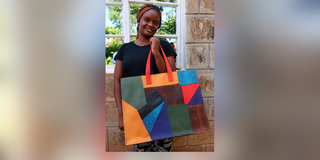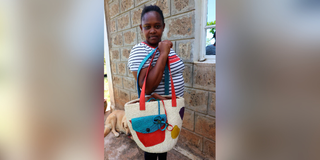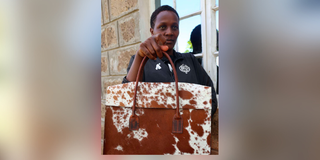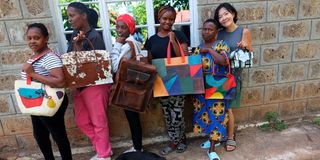The unstoppable deaf mums of Murang'a who turned rejection into a multi-million empire

From left: Faith Mwende, Ruth Katuki, Charity Maina, Evelyn Awino and Mary Muthoni pose for a photo with bags that they made, at Kabati Village in Murang'a County on December 6, 2024.
What you need to know:
- In a sunlit workshop in Kabati, Murang'a, deaf single parents are defying societal barriers by crafting high-end leather bags that are now sought after in international markets.
- Through Nashipai Leather, they have transformed from struggling street hawkers and marginalised members of society, into skilled artisans earning steady incomes.
- The women produce around 50 premium bags monthly, priced between Sh5,000 and Sh35,000.
The rhythmic hum of sewing machines echoes through a sunlit workshop in Kabati, Murang'a, Murang’a County. Here, amidst the gentle whirr of machinery and the soft rustle of leather, a remarkable story of transformation unfolds – one where deaf single mothers are defying societal barriers to find not just employment, but dignity and economic empowerment.
In this expansive compound, dominated by an imposing maisonette, we find Evelyn Awino behind her sewing machine on a bright Friday morning. She's so immersed in her work at the Nashipai Leather workshop that our presence goes unnoticed, her skilled hands steady and sure as they guide premium leather through her machine.
Through a translator, Evelyn shares her journey. Born 25 years ago in Nairobi's Korogocho slums, she grew up in a family of four as the only member with a disability.
"When I was young, I stayed with my parents and I was in a special school," she recounts.

Evelyn Awino with a leather bag she made at Nashipai Leather Kenya at Kabati, Murang'a County in this photo taken on December 6, 2024.
"When I was aged 11, I was supported by missionaries who paid for my secondary education and later took me to college for a sewing machine operator course."
Today, as Nashipai Leather's Chief Designer, Evelyn crafts at least three bags each week, her work providing not just for herself but for her family as well. Her eyes sparkle with determination as she shares her vision of one day owning a similar company. "This will help me to empower more people, particularly women living with disabilities who have been forgotten and neglected," she explains.
The daily challenges she faces are significant, with communication barriers topping the list. "Men always approach me, but when they realise that I am deaf, they speed off," she reveals, a mix of frustration and hope in her expression.
"Despite this, I would one day get married and have my own family."
Her message to girls with various forms of disability resonates with strength and purpose: "Girls like me should know that disability is not inability. They have the ability to work and carve out a living just like other people. They have the ability to make this happen and ensure they have a bright future."
As 2023 drew to a close, another woman's story was about to intersect with Nashipai Leather. Ruth Kaluki found herself struggling to maintain her business selling African wear (kitenge) in Ngara, Nairobi.
As a widowed mother, the mounting pressure to provide for her child seemed overwhelming until a friend mentioned an organisation offering vocational training to people living with disabilities.

Ruth Katuki who is deaf displaying a leather bag at Nashipai Leather Kenya at Kabati, Murang'a County on December 6, 2024.
"I decided to take up the opportunity and underwent training as a sewing machine operator after which I got a job at Nashipai Leather as a bag maker," Kaluki shares.
"Through the money that I earn here, I am able to pay for my son's school fees, buy food, clothing and pay rent for our house. I can only term this opportunity as God-sent."
Kaluki's story carries both loss and hope. Married in 2018 to a man who was also deaf, her world changed dramatically when her husband died in a road accident in 2020, leaving her pregnant.
"My husband died as a result of a hit and run case. Since the day we buried him, I have never heard again from my in-laws. They went mute on me. I am, however, glad that nothing that belonged to my husband was taken away from me," she reflects.
The challenges of communication persist in her daily life.
"Communication has been a serious challenge for me in matatus and other public places. Also, when I visit my parents and relatives back in the village, it is very difficult to communicate. To avoid this with my son, I am training him on the basic sign language skills in order to interpret for my relatives whenever we visit our rural home," she explains.
These personal stories reflect a broader challenge in Kenya, where approximately 85 percent of deaf people face discrimination, communication barriers, and limited access to essential services. This has led to social inequality and poverty, with many finding themselves marginalised and isolated from full social participation and inclusion.
Charity Maina from Kasarani, Nairobi, knows these struggles intimately. Before finding her way to Nashipai Leather in January this year, she hawked ladies' blouses at Nairobi's Muthurwa market, battling daily with poor sales and harassment from Nairobi County authorities.

Charity Maina displays a leather bag at Nashipai Leather Kenya at Kabati, Murang'a County on December 6, 2024.
When her church announced an opportunity for women with disabilities to pursue vocational training, Charity seized it immediately.
"After graduating, I was absorbed at Nashipai Leather where I have been working as a knitting assistant since January. This is a good job compared to being a hawker in Nairobi that was characterised by endless running battles with county askaris," she says.
As a single mother of two sons, Charity's life has transformed significantly.
"I am happy that I now have a stable job, which has helped me to put bread on the table. I am now able to buy food, clothing and pay for rent without any difficulties. I also have a house help who helps take care of my sons as I work. At Nashipai Leather, I am working in peace. No running battles with county askaris as was the norm in Nairobi," she shares.
Though separated from her husband after what she terms "irreconcilable differences," Charity maintains her optimism about future relationships. Her immediate focus, however, is on advocacy for the disabled community. She urges the government to absorb more people living with disabilities into the civil service, which would help many afford essential items like hearing and walking aids.
Behind these stories of transformation stands Judy Kang from South Korea, who, along with her daughter, founded Nashipai Leather. As a missionary at Eltoto Church in Nairobi’s Dandora for the past 16 years, Kang recognised the unique challenges faced by deaf women in her congregation and decided to act.
"As a church, we thought of helping them since getting a job is so hard for them. We started with beads then transitioned to the leather bags," Kang explains from her home in Kabati, Muranga.
"The impact is profound. These mothers now provide for their families, breaking the cycle of poverty while serving as role models in their communities. Their journey exemplifies how sustainable livelihoods can uplift marginalsed groups, fostering inclusivity and resilience."

From left: Ruth Katuki, Charity Maina, Faith Mwende, Evelyn Awino and Mary Muthoni who are all deaf, are joined by Judy Kang, a designer at the Nashipai Leather Kenya in this photo taken on December 6, 2024 at Kabati Village in Murang'a County.
The workshop uses cow, sheep, and goat skin to craft their products, producing approximately 50 bags monthly, with increased production for special orders. Prices range from Sh5,000 to Sh35,000, reflecting the quality and craftsmanship of each piece.
Their shop in Kileleshwa, Nairobi, serves as a showcase for their work, but their reach extends far beyond Kenya's borders.
"Many people admire our leather bags for their quality and style. They have gained attention locally and internationally," Kang notes proudly.
Their products now find homes in the USA, UK, France, Sweden, and South Korea, among other countries. However, challenges remain.
"It is not easy working with deaf women/mothers, they can be very emotional and vulnerable at times. Language barrier is also a major challenge and we have to depend on the services of a translator. We also do not have mass production as we do the bags using our hands. We need a machine to increase our production," she explains.
Yet for Kang, the rewards far outweigh the challenges.
"I am always happy when I see these women working here. My happiest moment is when I hear them laugh. It gives me satisfaction to know that they are happy too," she says, her face lighting up with joy.
This initiative has garnered support from multiple stakeholders, including Generation Kenya and the Embassy of Sweden in Nairobi.

From left: Faith Mwende, Ruth Katuki and Charity Maina make leather bags at Nashipai Leather Kenya at Kabati, Murang'a County on December 6, 2024.
Generation Kenya CEO Corrinne Ngurukie-Yamo sees it as a transformative program for deaf single mothers.
"By equipping them with vocational skills in sewing machine operation, the program enables participants to secure decent jobs and provide for their families, breaking cycles of poverty. Additionally, the training fosters their confidence and dignity by challenging societal stereotypes, demonstrating their capabilities, and ensuring safe and respectful working conditions," she explains.
Annika Otterstedt, Head of Development at the Embassy of Sweden in Kenya, emphasises the importance of such initiatives in their broader development goals.
"The impact we have seen so far is that those who have undergone the Generation Kenya program have significantly increased their chances of obtaining job opportunities, increased their earnings, and improved their ability to cater to themselves and their family needs. Additionally, we have observed that public-private partnerships are essential in accelerating job creation opportunities," she notes.
Beyond economic empowerment, the initiative showcases the importance of green practices, ethical trade, and social responsibility within Kenya's textile and fashion sectors. Each bag produced at Nashipai Leather represents not just skilled craftsmanship, but the resilience of these remarkable women who have found their voice through their work, proving that with the right support and opportunities, disability truly is not inability.
In this workshop in Kabati, every stitch tells a story of transformation, every completed bag represents a step toward independence, and every smile speaks of dreams taking shape. These deaf single mothers aren't just making leather bags – they're crafting a future where barriers break down and possibilities unfold, one piece of leather at a time.



